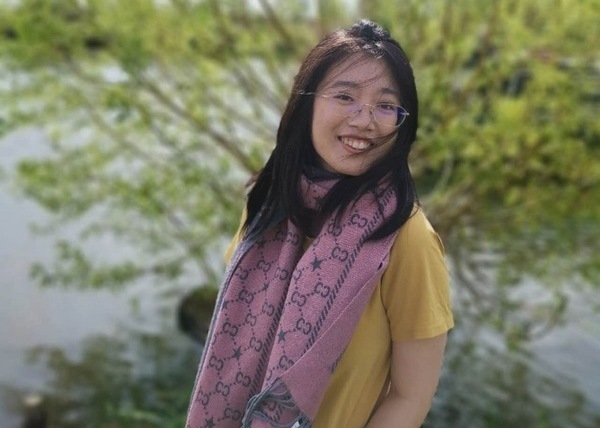Rachael Bevill Burns, Marilyn Keller and Cansu Sancaktar receive honorable mentions
Stuttgart – Siyuan Guo won the 2024 Outstanding Female Doctoral Student Prize, an award initiated in 2023 by the Max Planck Institute for Intelligent Systems (MPI-IS) to honor one outstanding female Ph.D. student each year for her scientific achievements and contributions to the research community. Siyuan is supervised by Bernhard Schölkopf, who leads the Empirical Inference Department at MPI-IS, and by Ferenc Huszár, a Professor at the University of Cambridge. In addition, three women received honorable mentions for this prize: Rachael Bevill Burns, Marilyn Keller, and Cansu Sancaktar.
“I am deeply honored to receive the MPI-IS Outstanding Female Doctoral Student Prize”, says Siyuan Guo. “This award is not just a personal achievement, but a recognition that highlights the contributions of female doctoral students in research. I am fortunate to be surrounded by accomplished colleagues who continually inspire innovation and fuel our collective enthusiasm for scientific discovery.”
Siyuan Guo takes part in the Cambridge – Tübingen Ph.D. Fellowship program. She started her doctorate in computer science in Cambridge in October 2021 and joined MPI-IS one year later. Her research incorporates causality into machine-learning methods, focusing on understanding causality in non-independent and identically distributed data. Siyuan earned her bachelor’s and master’s degrees in mathematics at the University of Cambridge, and a Master of Science in machine learning at University College London (UCL). Siyuan has lectured widely on her results, including invited talks at the ELLIS DeepMind Seminar, the University of Oxford, and UCL. Alongside many famous machine-learning professors, she will be the only Ph.D. student to teach at the upcoming 2024 Cambridge Summer School on probabilistic machine learning. Furthermore, she will soon be moving to New York City for an internship with Meta’s FAIR team.
“Siyuan came with a strong theoretical background and has since done work that is remarkably profound”, her supervisor Bernhard Schölkopf explains. “Siyuan is truly brilliant, and her work can have a transformative effect on the field of causality and machine learning. I believe that she can go very far.”
The Outstanding Female Doctoral Student Prize is part of the institute's 2024 –2026 Gender Equality Plan (GEP), aiming to increase gender equality in both MPI-IS sites, Stuttgart and Tübingen. The award also aims to inspire the research community to look for potentially unrecognized excellence among the female doctoral students. The winner receives up to 2,000 € to support career-building activities of her choice, such as attending a workshop or conference. An external scientific selection committee decides on the winner and the honorable mentions, taking particular care to avoid conflicts of interest with the nominees and their advisors. The 2024 selection committee consisted of
- Asja Fischer, Professor of Machine Learning at Ruhr-University Bochum
- Christian Theobalt, Director of the Visual Computing and Artificial Intelligence Department at the Max Planck Institute for Informatics, Saarland
- Georgia Chalvatzaki, Professor of Interactive Robot Perception and Learning at Technical University of Darmstadt
- Josie Hughes, Assistant Professor of Computational Robot Design and Fabrication at Ecole polytechnique fédérale de Lausanne (EPFL)
The winner and the honorable mentions were announced by Katherine J. Kuchenbecker at the MPI-IS Summer Colloquium on July 5, 2024. The other members of the prize organizing committee were Leila Masri, Florian Hartmann and Alona Shagan.
“With this prize, we seek to recognize and honor the achievements of women in research, particularly in the traditionally male-dominated fields of robotics and AI where our institute focuses”, says Katherine J. Kuchenbecker, Director of the Haptic Intelligence Department at MPI-IS, spokesperson for the International Max Planck Research School for Intelligent Systems (IMPRS-IS) and head of the award organizing team. “Currently, many prestigious and financially rewarding prizes in academia are dominated by male recipients, which can reduce fairness, recognition, and career opportunities for female scientists. Indeed, research has shown that advisors of all genders tend to think first of nominating their male trainees for honors. Thus, this prize aims to raise awareness about potential biases in the nomination and selection of awardees and to increase support for female scientists early in their careers. By offering this prize, we hope to provide additional career opportunities that might not otherwise be possible for the recipients.”
“I would like to express my gratitude to the award-organizing team for their exceptional efforts in creating a platform that celebrates the achievements of female doctoral students at our institute”, Siyuan Guo continues. “Being part of this initiative to promote diversity and empowerment is truly a privilege. I would also like to extend my heartfelt congratulations to the recipients of the honorable mentions. It is a pleasure to share this recognition with such talented individuals.”
The recipients of the three honorable mentions awarded in 2024 are:
Rachael Bevill Burns, who recently completed her doctorate with Katherine J. Kuchenbecker in the Haptic Intelligence Department at MPI-IS. Rachael’s work centers on human-robot interaction, finding feasible ways for endowing robots with touch sensing and emotional interaction capabilities. Her doctoral research explored what would be required to create companion robots for children with autism, considering all technical aspects, including sensor design, signal processing, machine learning, and robot behavior algorithms. As part of this work, Rachael conducted an online user study that showed how much people prefer robots that immediately react to touch and show emotions over time. Rachael earned her bachelor’s and master’s degrees in Biomedical Engineering at the George Washington University in Washington, DC, and joined MPI-IS in 2017 as a Whitaker International Fellow. An IMPRS-IS scholar, Rachael earned her doctorate in Computer Science at the University of Tübingen in February 2024 and presently works as a postdoctoral researcher. In January 2025, she will start as an Assistant Professor of Electrical Engineering and Computer Science at the University of Tennessee Knoxville.
Marilyn Keller, an IMPRS-IS doctoral student with Michael J. Black, who leads the Perceiving Systems Department. She specializes in computer vision, computer graphics, and virtual humans, focusing on learning and relating graphical models from multi‑modal data using advanced machine learning, deep learning and optimization. Her thesis tackles the problem of predicting the internal anatomy of a person from only their external body shape, which could be captured with a camera. Marilyn received her bachelor’s and master’s degrees in Engineering from Grenoble INP Phelma, and another master’s degree in electronics and information technology from the Karlsruhe Institute of Technology (KIT). She joined MPI-IS in 2019 and she was a visiting researcher at Stanford University’s Movement Lab for six months in 2022.
Cansu Sancaktar, an IMPRS-IS doctoral student with Georg Martius, who was previously a Max Planck Research Group Leader at MPI-IS and is now a Professor at the University of Tübingen. Cansu’s research deals with artificial curiosity and model-based reinforcement learning, with a focus on the field of self-motivated learning robots. She published highly original first-author papers at the prestigious NeurIPS conference in 2022 and 2023. She also won a best poster award from the IEEE RAS TC on model-based optimization for robotics in 2022. Cansu is skilled in the field of mathematics and software development, such that she was able to make substantial improvements to the state of the art. And with the advent of large language models (LLMs), Cansu is currently investigating their use in autonomous playful exploration. Cansu received her bachelor’s and master’s degrees in electrical engineering and information technology from the Technical University of Munich (TUM).









